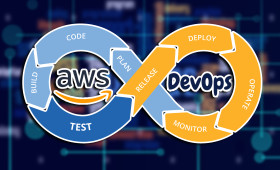Amazon Web Services
A DevOps with AWS course is designed to equip individuals with the skills and knowledge necessary to implement DevOps practices and methodologies using Amazon Web Services (AWS) as the underlying cloud infrastructure. DevOps is a collaborative approach that aims to streamline the software development lifecycle, enhance collaboration between development and operations teams, and improve the deployment and management of applications.

Overview
A DevOps with AWS course is designed to equip individuals with the skills and knowledge necessary to implement DevOps practices and methodologies using Amazon Web Services (AWS) as the underlying cloud infrastructure. DevOps is a collaborative approach that aims to streamline the software development lifecycle, enhance collaboration between development and operations teams, and improve the deployment and management of applications.
Course Description
AWS Course Content
1. Introduction to Cloud Computing
- What is Cloud Computing?
- Benefits of Cloud Computing
- Cloud Deployment Models: Public, Private, Hybrid
- Cloud Service Models: IaaS, PaaS, SaaS
2. Introduction to AWS
- Overview of AWS Platform
- AWS Global Infrastructure
- Key AWS Services Overview
- Setting up an AWS Free Tier Account
- Navigating the AWS Management Console
3. AWS Identity and Access Management (IAM)
- Understanding IAM
- Managing Users, Groups, and Roles
- IAM Policies and Permissions
- Multi-Factor Authentication (MFA)
- Best Practices for IAM
4. Compute Services
- Amazon Elastic Compute Cloud (EC2)
- Launching and Configuring EC2 Instances
- Understanding Instance Types
- Elastic Load Balancer (ELB) and Auto Scaling
- Elastic Block Store (EBS)
- AWS Lambda
- Introduction to Serverless Computing
- Creating and Deploying Lambda Functions
5. Storage Services
- Amazon Simple Storage Service (S3)
- S3 Buckets, Objects, and Storage Classes
- S3 Versioning, Lifecycle Policies, and Encryption
- Amazon Elastic File System (EFS)
- Amazon FSx
- AWS Storage Gateway
6. Networking and Content Delivery
- Amazon Virtual Private Cloud (VPC)
- Subnets, Route Tables, and Gateways
- Security Groups and Network ACLs
- Elastic Load Balancing (ELB)
- Amazon Route 53
- DNS Management
- Amazon CloudFront
7. Databases
- Amazon Relational Database Service (RDS)
- Setting up MySQL, PostgreSQL, and SQL Server
- Backup, Restore, and Monitoring
- Amazon DynamoDB
- Amazon Redshift
- AWS Database Migration Service (DMS)
8. Security and Compliance
- Shared Responsibility Model
- AWS CloudTrail
- AWS Config
- AWS Trusted Advisor
- AWS Secrets Manager and Systems Manager Parameter Store
9. Application Integration
- Amazon Simple Queue Service (SQS)
- Amazon Simple Notification Service (SNS)
- Amazon EventBridge
- AWS Step Functions
10. DevOps on AWS
- Infrastructure as Code (IaC) with AWS CloudFormation
- AWS CodePipeline
- AWS CodeCommit
- AWS CodeDeploy
- Monitoring and Logging with Amazon CloudWatch
11. Machine Learning and Analytics
- Amazon SageMaker Basics
- AWS Glue
- Amazon QuickSight
- Amazon Athena
12. AWS Management Tools
- AWS Cost Management
- Cost Explorer and Budgets
- AWS Auto Scaling
- AWS Systems Manager
13. Real-Time Projects
- Hosting a Dynamic Website on AWS
- Setting Up a Scalable Architecture with Auto Scaling
- Implementing a Serverless Application with Lambda and API Gateway
- Configuring a Secure VPC Architecture
14. Mock Interviews and Job Assistance
- AWS Certification Guidance
- AWS Certified Solutions Architect – Associate
- AWS Certified Developer – Associate
- AWS Certified SysOps Administrator – Associate
- Resume Building and Job Search Tips
- Interview Preparation and Mock Interviews
Course Key Features
-
- Classroom and Online Training: Learn from the comfort of your home or in-person at our Hyderabad center.
- IT Experts as Trainers: Get trained by experienced professionals with real-world industry insights.
- Industry-Relevant Curriculum: Our course covers essential Java concepts, focusing on real-world applications.
- Hands-on Projects: Work on real-time use cases and projects to enhance practical knowledge.
- One-on-One Mentoring: Personalized attention from mentors to guide you through the learning process.
- Flexible Schedules: Choose from convenient training schedules to fit your lifestyle.
- 8 Hours of Lab Support: Daily lab sessions to practice and apply what you've learned.
- Pre-Assessment Questions: Assess your knowledge before the course begins.
- Comprehensive Course Material: Get access to well-structured study materials for self-paced learning.
- Lifetime Valid Swhizz Certification: Earn a certificate recognized for its credibility and validity.
- Resume Building: Assistance in creating a professional resume to stand out to employers.
- Interview Guidance: Receive expert tips on how to prepare for and excel in job interviews.
- Mock Interviews: Simulate real job interviews for better preparation.
- Job Drives with Top Companies: Access exclusive hiring opportunities through our extensive network.
- Internship Opportunities: Gain industry exposure through internships with leading companies.
- Tie-ups with 100+ Clients: Partnered with top firms for job placements and career support.
Join Swhizz Technologies today to kickstart your career in DevOps
Benefits
-
- Comprehensive Curriculum: Covers all key concepts from basics to advanced topics.
- Hands-on Learning: Apply concepts through real-time projects.
- Expert Mentors: Learn from industry experts with practical experience.
- 100% Placement Assistance: Resume building, interview preparation, and job placement support.
Enroll now to masterDevOps and pave your way to a successful career in software development!
Who Should Attend
- How it helps in continuous delivery and offers solutions to problems
- The common Infrastructure Servers, Scalability and Availability
- To implement Automated Installations and Deployments
- Performance and basic Security for Infrastructure
- To Implement Virtualization Concepts
- The need and concepts of Monitoring and Logging
- The Continuous Integration and Deployment (CI/CD)
- Various DevOps tools Chef, Puppets, Jenkins, Docker, etc.
- How DevOps provides business benefits
Course Outline for
- Chapter 1: Introduction to DevOps
- Chapter 2: Maven - Build Automation Tool
- Chapter 3: - Deployment Environment - Tomcat Web Server
- Chapter 4: Artifactory Repository Management - NEXUS
- Chapter 5: Source Code Management Tool - GITHub
- Chapter 6: Jenkins - Continuous Integration Tool
- Chapter 7: DEVOPS: Ansible
- Chapter 8: Containers - Docker
- Chapter 9: - DEVOPS: CONFIGURATION MANAGEMENT
- Chapter 10:- DEVOPS Engineer Activities
Examination and Certification
DevOps Foundation Training and Certification course exam format
- Multiple choice question
- 40 questions per paper
- 60 minutes time duration
- Minimum passing marks is 26 i. e. 65% requirement
- Closed book method( Referring other books are not allowed )
Eligibility:
- Software Developers
- Technical Project Managers
- Architects
- Operations Support
- Deployment engineers
- IT managers
- Development managers
- IT Developers and IT Operations Personnel
- Software Automation, Testing and Security Professionals
- DevOps Consultants and Stakeholders
- A basic knowledge of Linux or scripting is good to have. For this, we provide you with a free Linux self-paced course to help speed up your learning.
- A prior IT experience would be necessary for learning this technology.
- Developers who are interested in the system administration and configuration domain can opt this course
- IT professionals who want to work with DevOps tool
- System Administrators
- Project Managers
- Operating Engineers
- Build and Release Engineer
- IT professionals who are in the cloud servers can opt
- IT Architects who are the learners of configuration automation and want to have hands on experience on chefs
- Decision makers
- Business Intelligence Professionals


